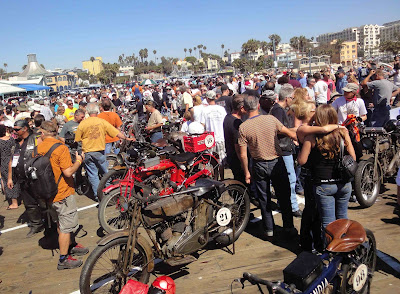After two weeks and 3200 miles, the Motorcycle Cannonball Endurance Rally arrived at Santa Monica pier, relatively intact, looking none the worse for their experience, and quite relieved to be finished! A hero's welcome awaited them as a crowd of nearly 2000 people waved flags and banners, cheered frantically, and crowded the finisher's path, each elbowing their way forward to see and photograph this unique scene.
It was a hard run. Most of the riders felt comfortable with the 'sitting on a 100 year old bike for two weeks', as sprung saddles and forks are generally a step up from bicycling...although one rider (Bill Rodencal) had no suspension at all - not even on the saddle - and truly wins my respect as an 'iron butt'.
What became less than comfortable for many competitors was the Minimum Daily Requirement of maintenance, as those thousands of miles included hundreds of hours dismantling/repairing/fabricating vital parts, and 'endurance' became the very watchword.
Several motorcycles didn't make the distance, and arrived on sidecar floats or in the back of the chase vehicles...melted cylinder heads, irreplaceable pistons, the nth broken crankshaft, became a nearly insurmountable obstacle to some. Others, perhaps just that much more stubborn - like Pete Young and Jon Szalay - repeated total crankshaft remanufacture several times, at a huge cost of time, and a bit of money too.
The crankpin on Pete's 1913 Premier broke twice - on the very first day, when a local machine shop worked through a weekend night to copy a new pin, gratis - and a week later in Texas, where the generosity was thin, and Pete 'had to pay through the nose' for his third pin of the rally. Inconsistent oiling (via a hand pump only), high ambient and running temperatures (crossing Oaklahoma isn't exactly a picnic jaunt in Surrey), and the need to keep up with the pack, meant the Premier was tested in a way never intended or even conceived by the manufacturer.
Jon Szalay similarly ran through three connecting rods on his 'Silent Grey Fellow' Harley, as they snapped like carrots under similar strain of its no-gear direct belt drive. Jon had planned ahead and included a rod in his spares kit, but the need for a second spare rod was unforseen. Now he has an epic tale of sitting dejected at a café, lamenting his broken Harley to a local farmer, who brightened up and said, 'You don't need an automotive rod - you need a tractor rod! I have just the thing!', and took him 40 miles into the boondocks to his barn, where he dug through an enormous pile of engine parts, to emerge with the gleaming New Old Stock item, which had the center-to-center length dimensions Jon's H-D needed. 'A few' hours spent machining the rod ('it was beautiful steel', says Jon) down to the width required, and he was left only to make a new plain bearing for the big-end. The farmer was kind enough to give him the special graphite-impregnated bronze rod necessary, and Jon made the rest of the journey without such trouble again.
Every rider save one had such tales (I didn't catch his name - he rode a '15 H-D) of repairs made on the fly, coping with seizures and flats, using beer cans, worm clips, and duct tape to keep the beasts together. But, in the end, most of them made it. I predicted mechanical carnage from the start, and indeed it happened, but the determination of all the riders to press on regardless shows just what Real Riders are made of.
During the two weeks ride, enduring bonds were formed between some of the riders, who had perhaps heard of each other previously, but a swap-meet greeting or AMCA meet affords little time to truly get to know another rider, who might live across the country. Several entrants spoke of 'learning who you love' during their time together, and I heard not a word of the opposite, such was the respect each of them grew for each other in this less-than-rational endeavor.
And, it was a competition, and there were winners - three in fact from the three classifications; 1. Single-cylinder, single speed 2. Twin and Four-cylinder, single speed 3. Single,Twin, and Four cylinder, 2 and 3 speed gearboxes.
In category 1, the most 'primitive' form of motorcycling - no gears, no clutch, just an engine, and a belt connecting a pully on the crankshaft and the rear wheel - was Katrin Boehner on her 1907 JAP 250cc single. The JAP itself is an extremely rare motorcycle, as J.A. Prestwich and Co. produced motorcycles for a very brief moment before WW1, before concentrating entirely on engine production.
As the JAP is direct-drive and clutchless, Katrin had to 'kill' her engine at every stop, and run-and-bump the JAP into life when the traffic lights turned green. To stir your imagination; on the final run into Santa Monica, the Cannonball route passed through 55 stoplights, without a police escort to scoot them through non-stop. Needless to say, after 3300 miles of such antics, Katrin is in excellent physical condition! (The JAP is one of only two overhead valve machines on the ride - the other being a Pope single-cylinder.) She won the top Cannonball prize, well deserved, of a one-off Jeff Decker sculpture of 'Cannonball' Baker himself. Bravo Katrin!
Bradford Wilmarth won category 2 on his 1913 Excelsior, and Rick McMaken and his 1915 Harley Davidson won the multi-gear award - both received original artwork related to Cannonball history. Congratulations to all!

























